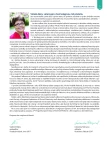-
Medical journals
- Career
Adherence to treatment according to the psychologist
Authors: Šárka Slabá
Authors‘ workplace: Gynekologicko-porodnická klinika 1. LF UK a VFN v Praze
Published in: AtheroRev 2017; 2(1): 21-24
Category: Reviews
Overview
The most common causes of morbidity and mortality have currently been chronic multifactorial diseases, in connection with the treatment of which the term adherence has been mentioned quite frequently. The treatment of most diseases is dependent on the active cooperation between the patient and the doctor. It begins with (non)use of the medication as well as (non) keeping the regime recommendations and ends with an overall change of the lifestyle. It used to be rather common to evaluate the failures of therapy only by the reduced compliance on the part of the patient. It was ingrained in the role of the doctor as almost absolute authority. Currently, a model of the patient being a partner to the doctor and being co-responsible for the treatment on the basis of all the available information provided by the doctor has been realized. To increase the effectiveness of treatment, it is necessary to create a therapeutic relationship between the doctor and the patient and not only “cure” the patient.
Key words:
adherence, compliance, motivational talks, intervention
Sources
1. Adherence to long-term therapies: evidence for action. WHO 2003. Dostupné z WWW: <http://apps.who.int/iris/bitstream/10665/42682/1/9241545992.pdf>.
2. Bankovská Motlová L. Nonadherence k léčbě. Přednáška v rámci doktorského studia.
3. Mansoor SM, Krass I, Aslani P. Multiprofessional interventions to improve patient adherence to cardiovascular medications, J Cardiovasc Pharmacol Ther 2013;18(1): 19–30. Dostupné z DOI: <http://dx.doi.org/10.1177/1074248412442001>.
4. Miller WR, Rollnick S. Motivační rozhovory: Příprava lidí ke změně závislého chování. Sdružení SCAN: Tišnov 2004. ISBN 8086620093.
5. Rosner F. Patient noncompliance: causes and solutions. Mt Sinai J Med 2006; 73(2): 553–559.
6. Stotland NL. Improving patient compliance by understanding some etiologies of non-compliance. Primary Care Update for OB/GYNS; 10(3): 116–119.
7. Soukup J, Papežová H. Motivační rozhovor s pacientem o změně rizikového chování. Dostupné z WWW: <http://motivacnirozhovory.cz/Soukup%20MI%20postgrad.med.pdf>.
8. Vrablík M. Adherence a možnosti jejího ovlivnění. Medicína pro praxi 2013; 10(11–12): 369–371
Labels
Angiology Diabetology Internal medicine Cardiology General practitioner for adults
Article was published inAthero Review

2017 Issue 1-
All articles in this issue
- The review of drug interactions and risks of statin therapy
- Adherence to treatment – an important part of reaching therapeutic effects on chronic conditions
- Adherence to treatment according to the psychologist
- A diabetologist‘s view on the metabolic surgery in the treatment of patients with type 2 diabetes
- The common position of the Czech professional associations on the consensus of the European Atherosclerosis Society and the European Federation of Clinical Chemistry and Laboratory Medicine regarding investigation on blood lipids and interpretation of their levels
- Athero Review
- Journal archive
- Current issue
- Online only
- About the journal
Most read in this issue- Adherence to treatment – an important part of reaching therapeutic effects on chronic conditions
- The review of drug interactions and risks of statin therapy
- Adherence to treatment according to the psychologist
- A diabetologist‘s view on the metabolic surgery in the treatment of patients with type 2 diabetes
Login#ADS_BOTTOM_SCRIPTS#Forgotten passwordEnter the email address that you registered with. We will send you instructions on how to set a new password.
- Career

